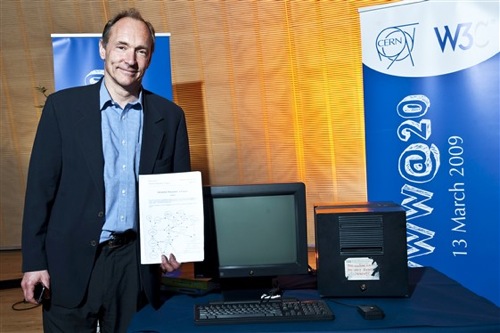|
|
"Vague, but exciting," were the words used to describe a paper written 20 years ago this month by a software consultant at CERN, a large research laboratory outside Geneva, Switzerland. Little did anyone know just how exciting the idea contained within that proposal would prove to be -- the idea was that of the world wide web. Less than two years later, on Christmas 1990, the first webpage got its first hit. Tim Berners-Lee, the man behind the idea, intended it as a way to connect the computers at the laboratory, allowing scientists to do experiments on one computer, crunch data on another, and then share that data with still more computers around the lab. It served that purpose and, as we now know, did a heck of a lot more, too. As it has changed, Berners-Lee has helped to see the web realize its potential as leader of the World Wide Web Consortium at M.I.T.

To clarify, the "web" and the Internet are two different things. The Internet is the physical network that connects computers and its rules, while the web is an application for using that network, defined by pages which can be accessed at specific, universal addresses, or websites. E-mail and file transfer protocols also use the Internet, but in different ways.
Now, marking the 20th birthday of the web, CERN and others are celebrating Berners-Lee's innovation. This includes recognition of how far the web has come since its beginnings, but also looking at how well the web, in its current form, serves its original purpose: helping scientists communicate. Articles in SEED magazine and The Economist have both looked at the way in which more open communication has changed the scientific community. The web has decentralized science, allowing faster communication between more remote researchers, including those who may not enjoy some of the perks of working at large, well-connected institutions. Search engines have made it easier to track down the earlier research on questions scientists want to investigate. It has also thrown open the gates for the public to participate in science, whether that be through blogs, citizen science projects, or other types of web applications.
Still, as the article from The Economist points out, many scientists "have tended to lag when it comes to employing the latest web-based social-networking tools to open up scientific discourse and encourage more effective collaboration." As scientists learn to take advantage of the tools of the web, and as new ones are developed, it will be interesting to see how scientific research and the ways its results are communicated continue to change.
-Tim
Author's Note: This was submitted to the blog by Tim, one of our corespondents.
Sources:
http://info.cern.ch/Proposal.html
http://www.w3.org/History/1989/proposal.html
http://www.sciam.com/article.cfm?id=the-mind-behind-the-web
http://www.w3.org/Consortium/
http://info.cern.ch/www20/
http://seedmagazine.com/content/article/20_years_young/
http://www.economist.com/science/displaystory.cfm?story_id=13277389
http://citizensci.com/
Editor's Note: For more blogs from Dr. Rabiah, visit Science Chicago's website at: http://www.sciencechicagoblog.com
|